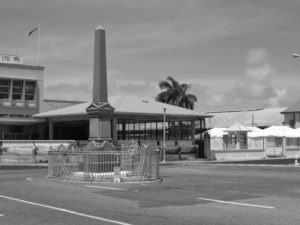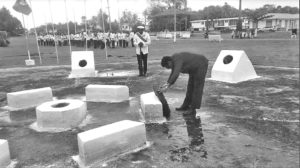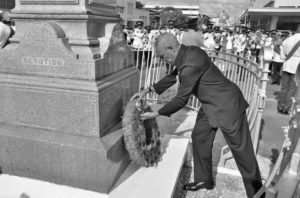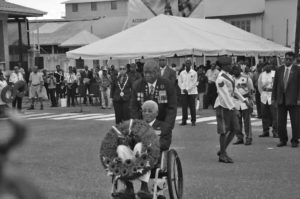Throughout our school lives, we were told that Remembrance Day, or Poppy Day as it is commonly known, is observed on the

second Sunday of November to pay homage to the lives lost during World Wars I and II. Today, November 11, is the second Sunday and it is also a very special day since it marks the 100th anniversary of the end of World War I.
In Guyana, the day is observed with a whole host of activities organised by the Guyana Veterans Legion as well as the annual wreath-laying ceremony at the various cenotaphs around the country. In Georgetown, officials and relatives of the slain warriors would lay wreaths at the Cenotaph honouring those who fought diligently.
Following a tradition inaugurated by King George V in 1919, the day is also marked by war remembrances in many non-Commonwealth countries. Remembrance Day is observed on November 11 in most countr
ies to commemorate the end of hostilities of World War I on that date in 1918. Hostilities formally ended “at the 11th hour of the 11th day of the 11th month”, in accordance with the armistice signed by representatives of Germany and the Entente between 5:12 and 5:20 that morning. The First World War officially ended with the signing of the Treaty of Versailles on June 28, 1919.
The first Remembrance Day was observed when King George V hosted a banquet in honour of the President of the French

Republic on the grounds of the Buckingham Palace. The Service of Remembrance in many Commonwealth countries generally includes the sounding of the “Last Post”, followed by the period of silence, followed by the sounding of “Reveille” or sometimes just “The Rouse” (often confused for each other), and finishes with a recitation of the “Ode of Remembrance”. The “Flowers of the Forest”, “O Valiant Hearts”, “I Vow to Thee, My Country” and “Jerusalem” are often played during the Service. The Service also includes wreaths being laid to honour the fallen, a blessing, and national anthems.
A two-minute silence is observed at 11 am to remember the people who have died in wars. The first two-minute silence in Britain was held on November 11, 1919, when King George V asked the public to observe a period of silence at 11 am. This was one year after the end of World War I. He made the request so “the thoughts of everyone may be concentrated on reverent remembrance of the glorious dead”. Guyana, then British Guiana, became a part of the Second World War in 1939 afte
Guyana, then British Guiana, became a part of the Second World War in 1939 afte
r the United Kingdom’s declaration of war on Nazi Germany. Like all the other British colonies in the West Indies, British Guiana gave full support to the Allied war effort by providing personnel for the British Armed Forces, land for an American military base, and raw materials for war production.
Although the Guyanese economy initially suffered as a result of the war, large-scale infrastructural projects were undertaken, in order to optimise the production of goods for the war effort, and by the war’s end in 1945, the economy had more than recovered. There were also significant changes in the country’s political system during the same period, such as the legalisation of political parties and the enfranchisement of women. Today, Guyanese still remember those fallen heroes who helped to end the war. There are about 15 World War II veterans still
Today, Guyanese still remember those fallen heroes who helped to end the war. There are about 15 World War II veterans still
alive.(Sunday Times Magazine)



